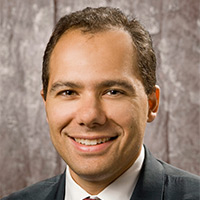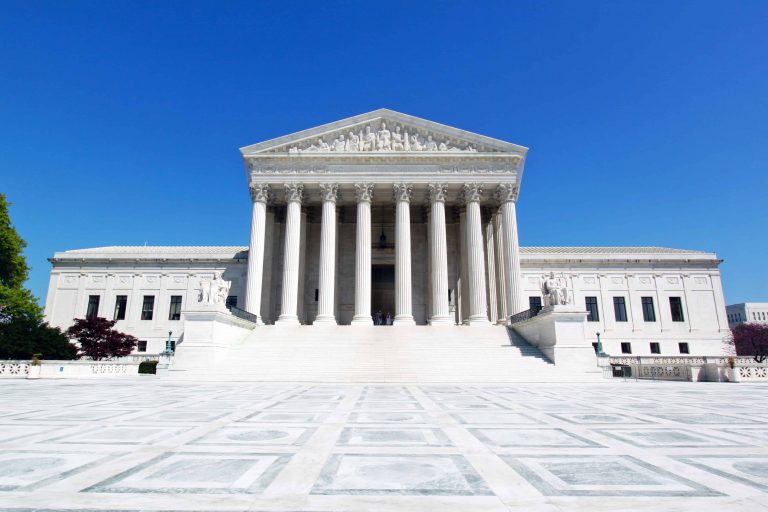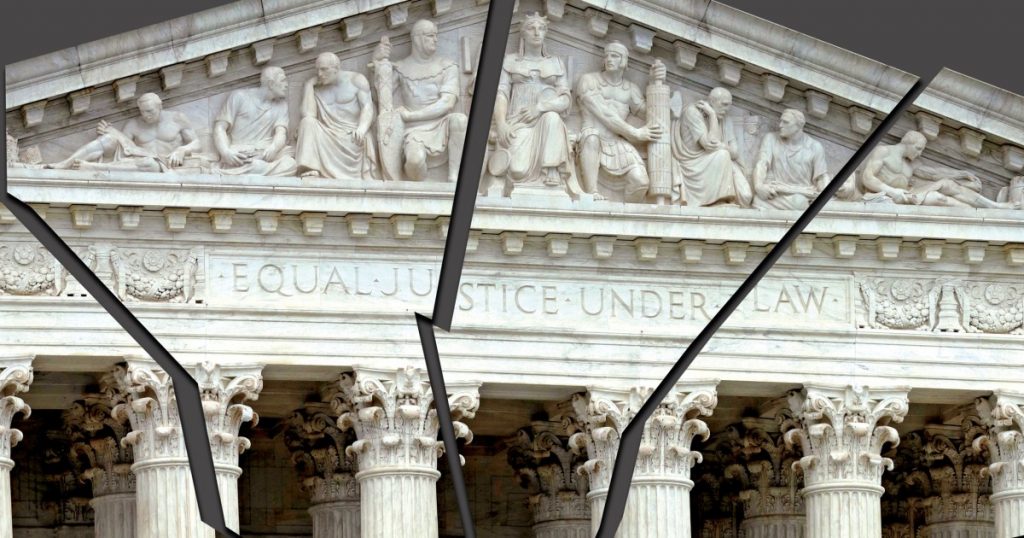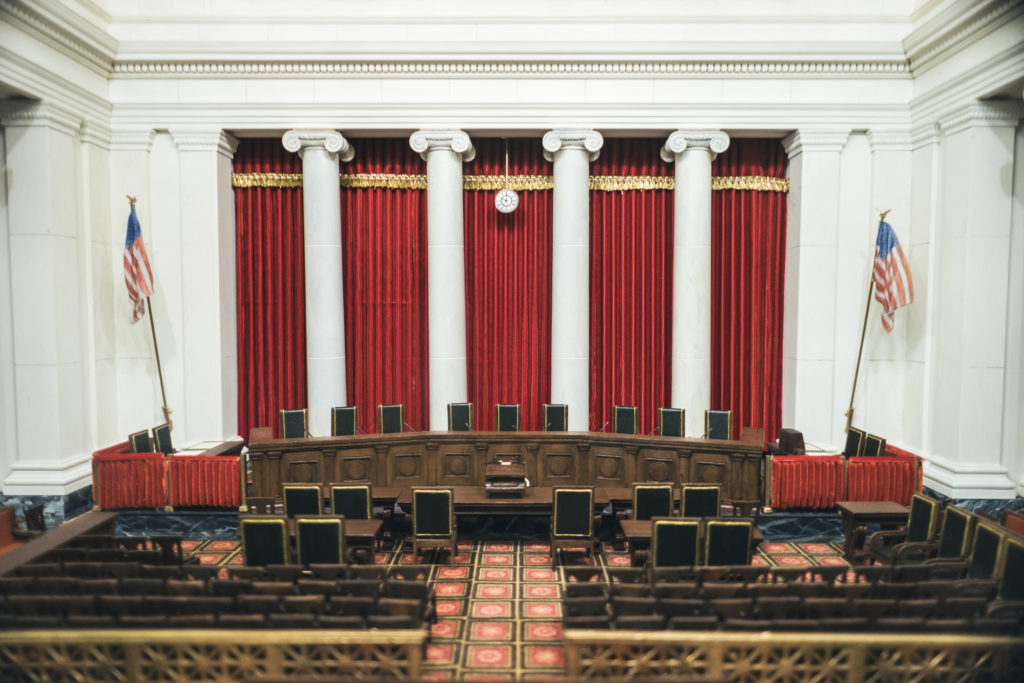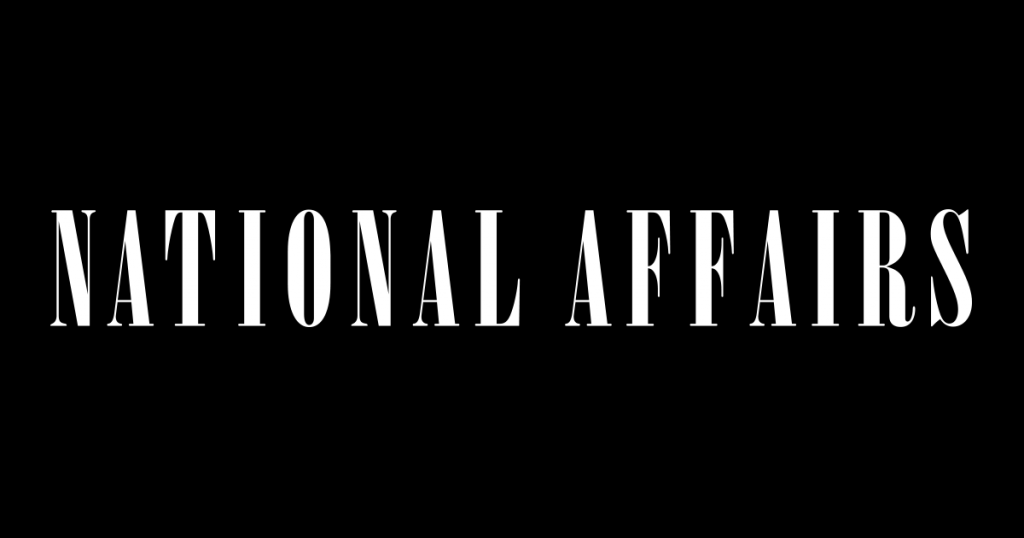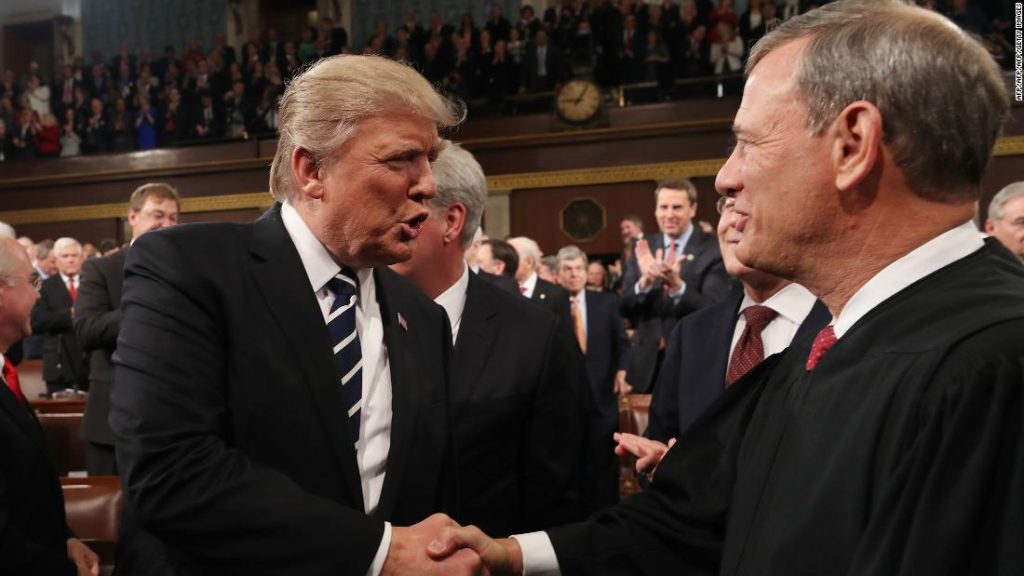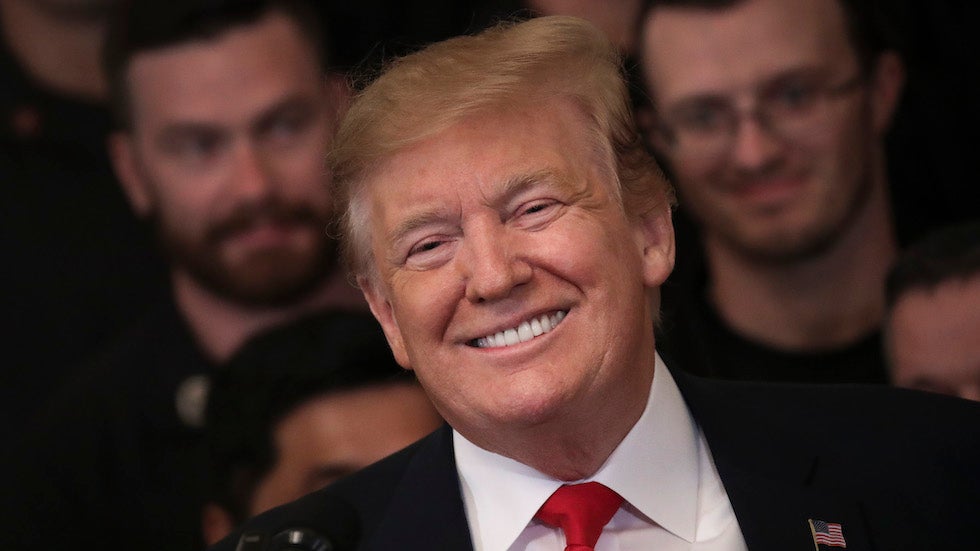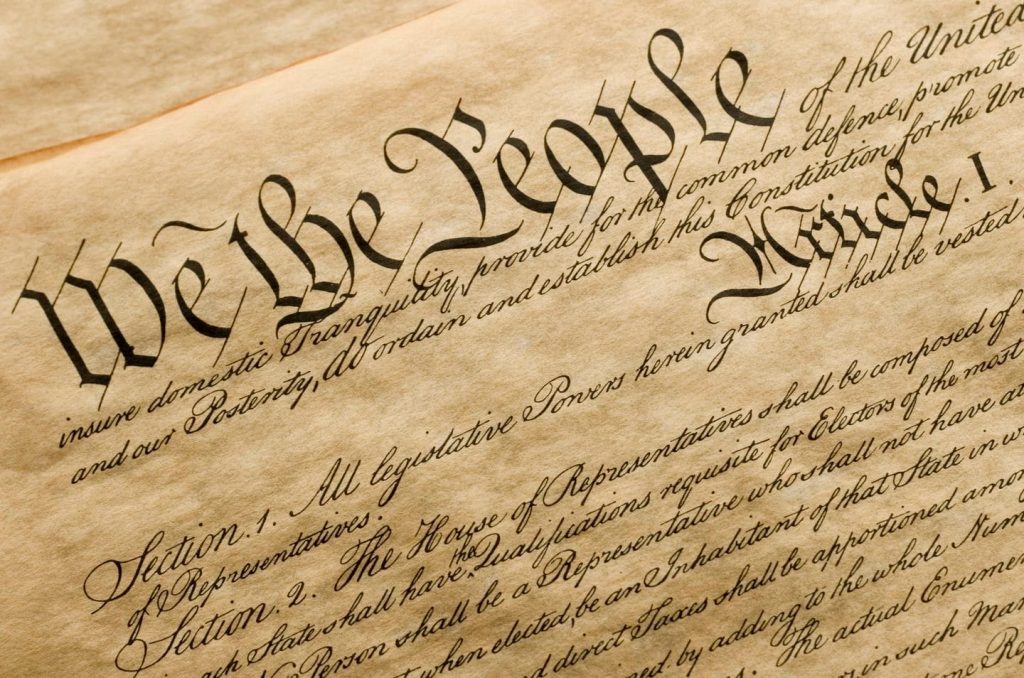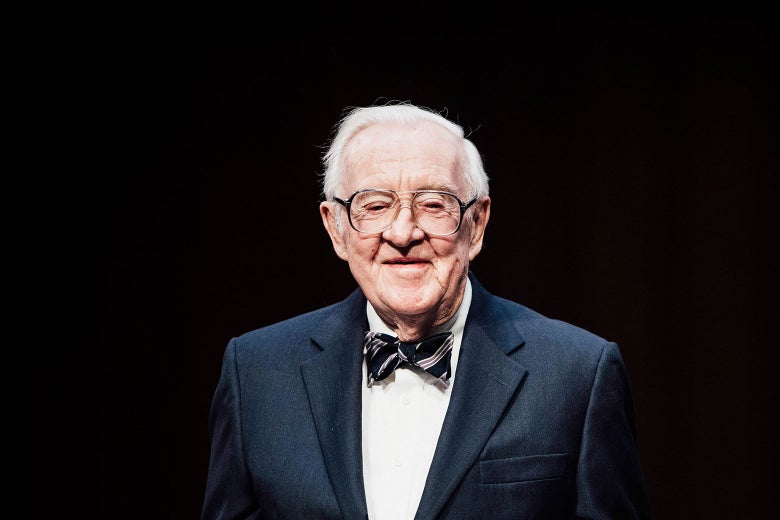Episode
Should the U.S. Supreme Court Overturn More Laws? (33:35)
In general, are most laws and regulations constitutional? Should the courts do more to enforce constitutional limits, or should they defer to the political branches unless there are blatant violations? Cato’s Ilya Shapiro and the Constitutional Accountability Center’s Elizabeth Wydra are joined by participating moderator Jonathan Rauch of the Brookings Institution to explore the role of the Supreme Court when laws conflict with the U.S. Constitution.
Join the conversation across social media with #Sphere.
Transcript
00:00 Caleb O. Brown: If Americans cannot broadly agree on much, we should be able to agree that the bitterness and political tribalism that is driving much of our public policy debate is unhealthy for our country.
The task of Sphere is to establish a forum that sets a gold standard for the public discussion of policy issues. In this episode, what is the role of the U.S. Supreme Court when laws conflict with the Constitution? Our resolution is this: The U.S. Supreme Court should overturn more laws. Welcome to Sphere.
Our Panelists are Ilya Shapiro, director of the Cato Institute’s Center for Constitutional Studies, Elizabeth Wydra, president of the Constitutional Accountability Center, and our participating moderator for today, Jonathan Rauch, a senior fellow at the Brookings Institution.
01:25 Jonathan Rauch: The U.S. Supreme Court should overturn more laws. Ilya Shapiro?
01:30 Ilya Shapiro: Absolutely it should. To play a proper role in our constitutional structure, with checks and balances and divided powers. When you think about it, Congress passes thousands of laws. In fact, it took about 140 years, 170 years, to generate 11,000 pages of the United States Code, and then that quadrupled in the following 40 or so.
And yet the rate of striking down laws by the Supreme Court and by the judiciary has not kept pace. So, what we’ve seen is a shift to a centralization of power in this country to Washington, and a shift more towards the executive branch as the regulators get more and more power.
And at the same time, the states are violating individual liberties. So, because of all of this, I think there’s a frustration in the body public and to maintain or regain faith in the legitimacy of our constitutional system, courts need to be more active — not activists — but engaged in striking down more laws.
02:29 Jonathan Rauch: Elizabeth?
02:31 Elizabeth Wydra: Yeah, so you know, I think it’s not so much some search for a platonic ideal of what number of laws the Supreme Court should strike down. In this, like most things, I start with the Constitution and we see in the Constitution that it vests in the judicial branch the power to hear all cases that arise under the Constitution.
And I think when it comes to cases that are properly before it, when the court is defending, and protecting, and ensuring constitutional rights and liberties, it should vigorously work to protect the Constitution. That being said, however, by having the three branches of government, the executive, the legislative, and the judicial, each part of that has a role to play in ensuring that our laws respect individual rights, respect the Constitution, respect the law.
And we’ve seen throughout history, you know, that there isn’t a perfect branch of government to protect these rights, and so we have, throughout history, looked in many ways to the courts to protect constitutional rights. But we saw, you know, before and after the Civil War, the Supreme Court not working to strike down laws that infringed upon freedom and equality.
And so, when the drafters of the Reconstruction Amendments, these great amendments that provided equality and democracy that ended slavery, they wrote into those amendments enforcement power for the Congress.
So, Congress was there to pass laws that would promote equality and liberty. And so, you could say perhaps then that there was a skepticism that the Supreme Court would protect these things and so, you know, the Supreme Court had been striking down too many laws, or wasn’t being activist enough. I want to say that the Supreme Court should just strike down the laws that violate the Constitution, which I know is an easy way out, but I will say that the court has an incredibly important role to play when it comes to making sure that we’re all able to really vindicate the rights that are promised to us in this founding charter.
04:36 Jonathan Rauch: Well, thank you. I’m going to put out a contrasting view, but I thought maybe before I did, I would draw you both out a little bit more.
First, a question to Ilya. So, what’s the limiting principle of how activist — forgive the term, but it is often used — how activist court should be? Is there no limit to the amount of deference they should receive in striking down democratically enacted statutes?
05:01 Ilya Shapiro: That’s the exact opposite of the question you should be asking, because the limiting principle is not on what courts are doing, but on what government is doing. The federal government, at least, gets all of its powers from the Constitution. It doesn’t have some limitless authority to solve whatever problems and slay whichever dragons it finds, and so the role of the courts is to hold political actors’ feet to the constitutional fire.
I wouldn’t say that court should defer to the political branches any more than, you know, the Congress should defer to the president, or the president defer to Congress. Each one plays its own proper role, otherwise you get this imbalance.
And so that’s why debates over whether something is activist or restrained, that’s beside the point. You know, activist in general just means I don’t like that ruling and coming from either the left or the right, it’s kind of a vacuous term. Nor do I think we should look to judges being restrained. I don’t want them being activist. I don’t want them being restrained. I want them to follow the law as they see it. And we can argue about what the proper way of interpreting the law is.
And so the reason why I can be so much more affirmative about this topic that we’re discussing is because I think the court, at least since the New Deal revolution in the late thirties and forties, has been too hesitant sitting on its hands, deferring unduly, way unduly, to the political branches rather than striking down these laws where I suggest almost, you know, a lot more, more often than not, the federal government goes beyond its remit.
06:29 Jonathan Rauch: So, that’s actually a good segue, because, Elizabeth, I was going to ask you — it’s I guess, kind of another version of the same question, which is okay, so where is the line between enough intervention, the right amount upholding people’s actual rights, and too much intervention, or too little intervention? What do you think of what Ilya just said?
I mean, is there a doctrine there, or is it just the court should all read the Constitution the way Ilya Shapiro wants them to read the Constitution?
06:53 Elizabeth Wydra: Oh God, please no. No, I’m just kidding. Sort of. So, you know, I think that I agree with Ilya in the sense that, you know, kind of talking about a court as activist or not is not really terribly helpful. You know, so I think that the idea that the courts should be restrained, well, you know, I agree with Ilya. I don’t want them to be restrained when they’re protecting individual liberty or, you know, ensuring that people enjoy the equality promised to them in the Constitution.
So, I agree with him on that. I think that if you look at the constitutional powers given to Congress that it gives broad authority to the federal government to provide national solutions to national problems. That includes things like national health care reform. You know, I know Ilya would disagree with me on that. And so, I think that the federal government has broad power to ensure the national welfare. I think that the courts have broad power to ensure that our rights and liberties are protected and that for every legal right there is a legal remedy.
07:53 Ilya Shapiro: Can I jump in there?
07:54 Jonathan Rauch: Yeah, please.
07:56 Ilya Shapiro: Because she said two things there at the end that are very important. She says government should have — the federal government — should have the power to promote the national or the general welfare, and she said it should have the power to protect our rights and liberties.
I agree absolutely with the second, and obviously we can debate what the scope of those rights and liberties are. But the first, I think, is part of where the Supreme Court started going wrong in the thirties, with the reconceptualization of what’s known as the general welfare clause, which originally the meaning of that meant that whatever Congress did, pursuant to its 17 enumerated powers in Article 1, Section 8 — everyone can check that if you are following along at home — the exercise of all those powers had to be for the general as opposed to the parochial, particular regional welfare.
But it has come to mean anything you can get a majority for in Congress, by definition, is for the general national welfare. I think that’s wrong. That’s part of where we get this explosion of federal power.
08:51 Jonathan Rauch: So, this is a disagreement not so much just about the courts, actually, it’s about the structure of the Constitution, Right? Because Elizabeth, you’ve written — I was just reading this this morning, a very interesting article arguing that the Constitution is not just about limiting the authority of the federal government, it is also about empowering a sufficiently strong federal government.
09:10 Elizabeth Wydra: Absolutely.
09:11 Jonathan Rauch: So that’s a pretty fundamentally different view of what the Constitution is trying to do, and therefore what the courts are trying to enforce, yeah?
09:18 Elizabeth Wydra: I think that’s right.
09:20 Ilya Shapiro: Well, I mean, the devil is in the details. Sure, we have a national government to do certain things, but it’s not, you know, national solutions to national problems. Again, it’s how you define those various terms. And then, you know, we’ve been talking at the federal level. When you get down to the states, you have states violating individual rights and liberties of various kinds despite the passage of the Reconstruction Amendments, the 14th Amendment especially.
And so, you know, there the Supreme Court is even more hesitant to strike down these laws and when it does, it gets accused of stomping on majoritarian rule, basically. Whatever your view of constitutional structure or federal power, the courts are supposed to be a counter majoritarian institution. You don’t need a court to protect popular speech or popular programs.
10:05 Jonathan Rauch: I have to say, I’m sorry, you’re both wrong. That’s of course, my appointed role in this debate. I’m speaking a bit against my own interest here and in conflict with myself because I’m married to a man, and I’m married to a man because of a Supreme Court decision in 2015 which said that same-sex marriage is a constitutional right in a close decision, 5-4, a pretty aggressive use of judicial power. Nonetheless.
10:35 Ilya Shapiro: In one of the rare cases where Elizabeth and I were together filing briefs.
10:38 Elizabeth Wydra: Absolutely, yeah.
10:39 Jonathan Rauch: On the same side. Speaking for myself and my husband, Michael, thank you both. So, I’m a fan of something called judicial minimalism. My favorite justice, Justice Sandra Day O’Connor, was kind of a minimalist and, not surprisingly, she came from a political background. But John Roberts, the current Chief Justice, has said, if it is not necessary for a court to decide a point in a case, then it’s necessary for the court not to decide the point in that case. Justice Alito has said let’s just focus on the case in front of us.
Minimalism isn’t an ideology, it’s not a philosophy. It’s more like a style, an attitude, which basically just says courts need to be careful. They’re very powerful actors. They’re less accountable than the other major actors in the Constitution. They often have very limited knowledge of the actual social realms in which they’re delivering opinions. There’s also political reason, which is when the Supreme Court steps in and decides things as a constitutional matter. It preempts the political conversation, the kind of compromise and organic change in politics that needs to go on to reconcile a complicated society.
So, for all those reasons, with important exceptions, we can talk about that, but as a matter of attitude, court should stand back. They should be modest. They should be minimalist to the extent they can be. Am I right? Am I wrong?
12:15 Elizabeth Wydra: No. You’re totally wrong, Jonathan. And I, you know, I want to say that, you know, the idea that the courts should be modest or minimalism being just a style, not an ideology, I don’t think that’s right, because deciding not to do something can sometimes have grave consequences for people’s enjoyment of their equality and liberty. You know, all of us every day have a stake in what the Supreme Court does.
You know, from the moment you wake up and whether or not you know, you can breathe clean air, drink safe water, you know, until when you go to bed at night and say your prayers to whomever you want to in your heart or not, and whoever you go to sleep next to, the Supreme Court affects all of those.
And they specifically talked at the founding about the idea that giving judges, as opposed to, in some cases, state juris, basically life tenure for good behavior, was so they wouldn’t have to have those political concerns. They could have constitutional courage. They could say, you know, look, whatever the political conversation, whatever the popular vote might be, when you come into the courts and stand on your rights and say I deserve equality because of the 14th Amendment, the court absolutely has to vindicate that right.
And I think that, you know, particularly in the marriage equality debate, when some judges took this stance of minimalism and said, you know, have this organic movement, have this conversation about, you know, I think one judge talked about being the hero of your own story.
Well, you know, part of the reason we have a Constitution that guarantees specific rights and liberties is so we don’t have to get our neighbor’s vote to live out the promise of equality in the Constitution. It’s our birthright.
14:14 Ilya Shapiro: I’d approach this in a slightly different manner. I don’t necessarily disagree with what Elizabeth just said, but you know, it’s attractive to talk about judges being modest. You don’t want to go too far and be seen as legislating or go farther than, you know, risk erring in a way that the Constitution that, you know, that you, the judge, gets the Constitution wrong. But the problem here is that having that attitude doesn’t withdraw the courts or the Supreme Court from the political debate.
It’s there. I mean, when you think about just in the last decade various cases, some striking down laws, some upholding them, you ask for specifics, Heller, about the right to keep and bear arms striking down a D.C. law, Obergefell, the gay marriage laws across the country, struck down, NFIB, the Obamacare individual mandate upheld, you know, controversies about how, but anyway, upheld. Shelby County, certain Voting Rights Act provisions struck down, Kelo v. New London, property rights claim failed. The city was allowed to keep developing. So, whether upheld or struck down, those are all very controversial cases that didn’t necessarily put the Supreme Court in a better light afterward.
So, I think we shouldn’t tell judges try to use some political judgment in being more deferential and being more minimalist. No, decide the law. Let the political chips fall where they may, because you’re going to be, you know, cause controversy regardless of what happens in these big, in these big controversies which, by definition, have to be resolved by the Supreme Court. They haven’t been resolved before and there’s lots of people on both sides.
15:53 Jonathan Rauch: It’s not just what the courts decide. It is also how they decide it, how they frame the narrative and the attitude they take. You have anything to add on that?
16:02 Ilya Shapiro: Well, it’s also that, historically, the court tries not to get too much ahead or behind public opinion. But the point is, if people don’t like the way that the law is being applied, or the way that what the court is doing, then the solution to that is to pass a constitutional amendment.
16:16 Jonathan Rauch: Well, you know that’s virtually impossible.
16:18 Ilya Shapiro: Well, it’s not supposed to be virtually impossible. It’s supposed to be hard. It’s supposed to be not simply anytime.
16:22 Jonathan Rauch: On the moon it might not be virtually impossible, but on earth it’s virtually impossible.
16:25 Ilya Shapiro: Well, this is again the fault of the Supreme Court in the late thirties, when it started to let slide, stop striking down large, new federal programs. It’s because that court, and starting with the New Deal era that the court started, you know, implicitly amending the Constitution without the people having to do it explicitly that we now think of it as this, you know, thing reserved only for such momentous things as giving women the right to vote or abolishing slavery.
But it’s, you know, until that time, amending the Constitution wasn’t that novel a thing. And that’s just an explication or an illustration of the problem of the court not striking down laws so people can react and say, oh, we didn’t realize that’s what the Constitution is. We need to change that to give the new federal, the larger federal government, that national power to solve this national problem.
17:16 Elizabeth Wydra: I mean, you know, we do have 27 amendments, so it’s not, you know, and some of them are from the modern era, so it isn’t impossible. And I think that the amendments are so crucial. This isn’t some — some ways why I, especially as a woman, am so focused on this document as being the basis for our rights in this society and not just looking to our political branches because we, the people, have over time amended the Constitution. I would not probably be sitting here at this table if we were just dealing with the Constitution as it stood in 1789.
17:51 Jonathan Rauch: Let’s bring in some of the folks who are here with us today. Any thoughts, comments, questions?
17:59 Audience member #1: Sure. So, we were talking about kicking it back to Congress out of, you know, because of this growth in the administrative state, but how would we do that? What would the court’s role look like in doing that?
18:13 Jonathan Rauch: Elizabeth, do you want to speak to that?
18:15 Elizabeth Wydra: Yeah. I mean, I think in some ways the court can put cues in even if they don’t fully disengage from the issue. You know, I think, telling Congress that you should take a closer look at these issues, that if you want to legislate in these areas, we’re going to kick it to you to come up with a good record, and that’s going to be the only way that we are going to be able to make decisions about whether these laws are an appropriate exercise of constitutional authority or not. You know, thinking perhaps to some of the gun cases, you know, or other areas of commerce clause legislation, you know, I think that’s a cue to Congress.
And maybe that’s part of why some of these laws don’t get struck down as much anymore, because Congress learned the lesson, and they said, oh, okay, we’ve got to legislate more vigorously in order to pass constitutional muster in its courts.
19:05 Ilya Shapiro: I don’t think Congress has learned any lessons. I mean kicking it back to Congress means saying yep, sorry, this does not pass constitutional muster, go back to the drawing board and start again. If you just, you know, defer to Congress, that’s not kicking the law back to Congress, that’s saying that as has happened effectively, Congress gets to pass the truth, goodness, and beauty act of 2019, and that’s very popular and the congressman all get reelected, but then the bureaucrats and the various agencies get to interpret that, and they start doing things that aren’t as popular.
And while the people can’t unelect the bureaucrats, all they can do is sue them, and so these issues ultimately end up in the courts. And if the courts keep deferring, well, that’s a vicious cycle of deference and what suffers are liberties that the Constitution is supposed to secure.
19:48 Jonathan Rauch: Although I understand that in an ideal world we would all look at the Constitution, agree what it says, and decide on that basis, we don’t agree what it says, and so we wind up in a world where we have to grasp for ways to deal with this. Can’t we just look at the plain language of the statute? How much does the text actually help us in the real world?
20:07 Ilya Shapiro: A fair bit if you take it seriously. People ask me what constitutional amendment would I propose, and number one on my list is at the end of every clause add and we mean it. Because if you actually enforce what’s there, it’s, you know, constitutional law, I’d be out of a job because it’s a fairly simple document. Sure, there are things that are left open to the political process, or the jury process about what’s reasonable and things like this, but you know what is interstate commerce?
It is commerce, not manufacturing, not agriculture, exchange of goods, interstate, across state lines. So not insurance, health or otherwise, not lots of things. But yes, it is does include interstate airplane transportation or internet, even though those things, you know, James Madison didn’t really have firm thoughts on violent video games, right? So, it’s not a matter of the Constitution being outmoded, because if you read it in the way that I suggest because of modern technological or other developments, it’s applying fairly straightforward terms, and if you don’t like it, if you feel it thereby becomes outmoded, then amend it.
As Elizabeth said, I fully agree. The Reconstruction Amendments, the second founding, as it’s sometimes called, added an important piece of the puzzle, not just in terms of equality and inclusion, but in terms of being able to seek remedies not just against federal oppression, but against state.
21:31 Elizabeth Wydra: So, I think the text is incredibly helpful, but then it also opens up further debate because, you know, a lot of the words that are used in here, you know, we think interstate commerce is a great example or, you know, I think perhaps even more profoundly what does equal protection mean? You know, these are important words to start from, but we can have huge debates about what they mean. You know, I think that at least being on the same like actual page is a great way to start, because then I’m not just saying like Ilya, you’re, you know, you’re just a bad person and that’s why you think that.
He can point to what he’s talking about in that document to say, I don’t think the government has this power, so — and I can say no, I think they do and I think this is a policy that promotes that. So, I think that, you know, we’re talking about civil discussion. I think the text is a really important point because we could have massive disagreements about what some of these words mean.
22:36 Jonathan Rauch: And that point about disagreement is really profound, you know, in the case that affects me so directly, Obergefell, the same-sex marriage case, which was a 5-4 decision, well, I believe that same-sex marriage is consistent with the rights in the Constitution.
But I’m the first person who would have to agree that the idea that the framers of the 14th Amendment say in 1868 had any notion that they were allowing guys to marry guys and women to marry women is preposterous. It is clearly not within the original intent. So then, if you believe in following the original intent, you have to say sorry gay people, that’s not what they had in mind in 1868.
23:19 Ilya Shapiro: I don’t know if anyone follows original intent anymore, if they ever really did. Originalists generally talk about original public meetings, so it’s not about trying to, you know, think about what the enactors of the 14th Amendment were thinking in 1868, or even whether they would have contemplated if the question was asked, but more, this is what our brief was all about, what does equal protection mean? Using analogies to class or cast legislation that certainly was struck down, or that’s what the contemplation was of that provision.
When I think Ted Olson was asked, who was arguing Hollingsworth versus Perry, the precursor to Obergefell, when did this right to gay marriage start under the 14th Amendment, then, in your theory? And he sort of didn’t really answer the question, but yes, the answer is 1868. Not because of original intent, but because of original meaning of those terms.
24:17 Elizabeth Wydra: But I do think it gets to the, you know, one of the things we started this conversation with, you know, if you have a view that you should defer to the elected branches or you should have the courts being more “activist,” you know, we don’t in our system, we don’t give one group of people more authority necessarily than others, you know? So, we don’t go by original intent of what the guys who, and they were guys, you know, thought when they were drafting the 14th Amendment. Fortunately, we go by what the text says, and the text doesn’t say, you know, it doesn’t get into the details of what equal rights are, fortunately.
25:01 Jonathan Rauch: Yeah, yeah. I like Ilya’s distinction, original text versus original meaning. What do you think of the original meaning as a concept?
25:09 Elizabeth Wydra: Yeah. So, absolutely. So, you know, I would talk more about, you know, at the Constitutional Accountability Center, we focus our arguments, and sometimes we agree with Ilya on these, as we did in the marriage equality cases, on the text and history of the Constitution. It’s perhaps another way of saying original meaning.
25:26 Ilya Shapiro: But remember what the marriage cases were about. They were about state licenses to marry. For me, this is kind of an occupational licensing sort of case, right? Does the state have, is there a good enough reason to distinguish between straight couples and gay couples for the purpose of marriage licenses?
Is this like a situation where for driver’s licenses, the state can deny driver’s licenses to blind people? Okay, but it can’t deny business licenses to blind people, right? So, you know, analogize does the state have a good enough reason for drawing its law in a particular way? And that’s the way I think the analysis should be in every circumstance. This is again on the right side under the 14th Amendment for state as opposed to federal action. This is not about whether the state has the power to do something here.
26:13 Jonathan Rauch: Next question.
26:15 Audience member #2: Forgive me for kind of pointing this directly at you, but earlier you mentioned how difficult it is in this, the year 2019, to get a constitutional amendment, and it seemed as if you are suggesting that that’s some kind of problem that needs to be remedied by the way the Supreme Court moves forward.
So, then what I would ask all of you is when we come to those loggerheads, when we are at those incredibly divisive issues, should our presumption be that the government can do something, or that it cannot? And if the presumption is that it can do something, well, then what is the real purpose of setting out limited powers in the Constitution?
26:50 Elizabeth Wydra: You know, sometimes it — you have constitutional amendments as important both for changes in legal doctrine, actually, but also for, you know, flash points of constitutional moments of change that happen through you know, popular movements. And, you know, there have been recent efforts to get constitutional amendments related to Citizens United.
Whether or not that actually comes to pass through an amendment, it certainly has energized a very large segment of society, and I think that’s a very good thing. You know, I think what we want to be careful about is, you know, one of the things that I think is great about our Constitution is that it, because it’s written, I think, in fairly broad, sweeping terms and not, you know, program by program, we don’t have to amend it all that often.
So I think the fact that it’s somewhat difficult to amend it is not necessarily a bad thing, because I think we’ve done it when it’s been incredibly important.
27:59 Ilya Shapiro: The question, though, I think is is there a presumption that what government does is lawful, is constitutional, or is their presumption that when the government restricts liberty in some way, which is another way of saying when the government creates some sort of program or takes action, is the presumption that that liberty should be upheld, should be deferred to?
Who bears the burden of persuasion? Is it the individual trying to exercise their liberty? Or is the government trying to justify a restriction or a regulation? The whole purpose of the Constitution, and the purpose of creating the new national government was to secure and protect our liberties. And so, I think you have to have a presumption of liberty rather than a presumption of constitutionality.
28:47 Jonathan Rauch: Well, you know, now is the time to have some closing comments. That was so beautifully put I am almost tempted to offer the opportunity to end the conversation there. Is there anything you’d like to add, or come back to?
29:02 Elizabeth Wydra: You know, listening to Ilya just talk right there, he has a presumption that when the government acts, it infringes liberty. I think that when the government acts, it can promote liberty, it can promote equality. I don’t think it’s necessarily an either-or. Certainly the government can act in ways that restrict equality and restrict liberty, absolutely, and those are the instances where the Supreme Court should strike down laws. But, I think that the government has broad power to ensure a well-functioning democracy, to ensure that within that democratic society, the bounds in which we meet each other in the public square are characterized by equality. Yes, of course, as someone mentioned earlier, the tools of oppression are often wielded by the majority, and that is why the court must be vigorous and vigilant in ensuring that the way in which we all come together is on equal footing, so that the majority cannot oppress certain groups from sharing that equal citizenship.
But I think there are many laws in which the government is acting to secure the blessings of liberty that were promised to us in the Declaration. And, you know, it’s important to note that the Declaration is what it is, a declaration. And then we moved to building a workable government in the Constitution. But the real promises of the Declaration weren’t really written into the words of our Constitution until the Reconstruction, until the second founding, until liberty and equality against both state and federal oppression were written into the Constitution.
So, you know, I unfortunately get back to the Supreme Court should strike down unconstitutional laws, which is not very helpful when you’re looking at whether they should strike down more laws or fewer laws, but I think that is the only way to look at it. And I would hope that when we’re looking at whether or not they should strike down certain laws, at least we all come together with the underpinnings of the Constitution’s sweeping words.
31:12 Jonathan Rauch: Out of pure altruism to avoid giving either of you the last word, I’m going to take it myself. I’m going to remember in 1984 Walter Mondale killed his presidential campaign by saying, at the Democratic convention, “Ronald Reagan will raise your taxes. So will I. He won’t tell you. I just did.” Bad political move. Nonetheless, in Mondale’s spirit, I’m going to say the problem I have with many of the views put out today is they may make some sense in theory, but in practice they don’t really give us very useful guidelines.
I don’t see delineating principles. I know we’re arguing about whether we — where the presumption should be, but I’m looking for principles other than the stock picker’s principle of buy low and sell high. And I don’t have those principles either. But to me, a strength of minimalism is we at least acknowledge that these cases are going to be epistemically hard and socially hard, that we have to start with where we are today, and we do say we can at least approach them with a certain attitude, one that may reduce the amount of risk and polarization entailed in the judicial process, so that would be my closing plea.
But the main thing I want to close with is to thank both of you and everyone here for this marvelous conversation today, which, at least to me, went so much deeper into fundamentals than is usually the case when we talk about these issues. So, on behalf of Sphere, and Brookings, and the Cato Institute, thank you both.
32:47 Elizabeth Wydra: Thank you, Jonathan, it was great.
32:49 Ilya Shapiro: Great.
32:50 Elizabeth Wydra: Great to chat with you.
32:52 Jonathan Rauch: It was great to have you here.
32:54 Caleb O. Brown: The task of sphere is to set a gold standard for the public discussion of policy issues. Thank you for joining us for this episode. Talk to you again next time.


